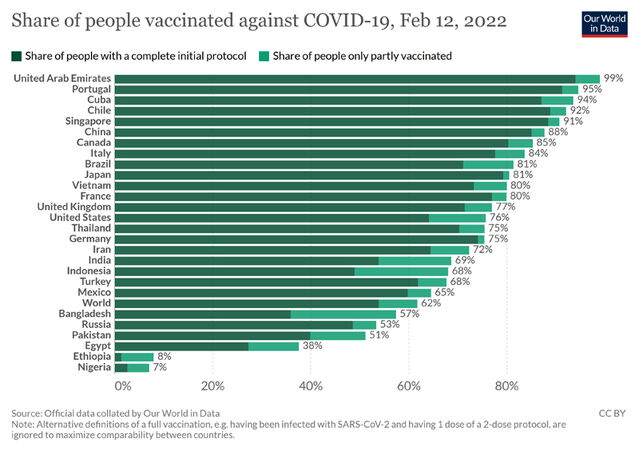Bias
Bias and Hate Over a Vaccine
Is our problem the distribution of vaccines or the distribution of mercy?
Posted February 22, 2022 Reviewed by Ekua Hagan
Key points
- An examination of the worldwide allocation of the COVID vaccine shows that undeveloped nations are unlikely to get even one dose.
- Many in wealthy nations ignore the human rights issue surrounding vaccine access and instead condemn each other for their vaccination choices.
- Unequal access to vaccines worldwide may reveal an unfair distribution of mercy.
Naomi is an unvaccinated worker at a clinic in a developed country. She's angry. She sacrificed a lot to get where she is. She holds strong beliefs which are now in jeopardy. She doesn't believe in the vaccine and thinks she has better odds if she puts her trust in nature and herd immunity. If her clinic mandates the vaccine, she will have to look elsewhere for work.
Adelina works at the same clinic as Naomi. Adelina is angry. She doesn’t believe in herd immunity. She believes the vaccine is her only hope. She gets furious at people who don’t want the vaccine. She's upset because she can't get a third dose, yet still has to go to work every day and risk being infected by those who don’t believe in the vaccine.
Adah is a poor woman in Nigeria. Adah isn't angry (even though she's poor). Adah isn't upset that she might have to compromise her "beliefs." But Adah is frightened that she or her child will die—because, unlike most wealthy countries, Nigeria does not have access to enough vaccines to get angry about taking.
The above stories are fictitious, but their predicaments are not. In my last post, I shared that there is bias in the expert distribution of lifesaving kidneys. I supported that hypothesis with peer-reviewed statistics. I concluded that our solution to kidney failure has unexpectedly made kidneys more precious than people. Now I would like to take it one step further. Perhaps medicine of any kind is becoming more precious than people? In our struggle to cure diseases, we seem to merely shift the problem from a biological dilemma to an ethical dilemma.
The Argument Against Poverty
In the worldwide distribution of this vaccine, that distribution seems anything but just and fair (Holder, 2022). Maps of the vaccinated world clearly evince which countries have more than enough and which have very little. The African continent stands out starkly as a light (unvaccinated) area surrounded by dark (vaccinated) neighbors. Quite plainly, the poorest people in our world are unlikely to get even one dose of the vaccine. Meanwhile, the citizens of wealthy nations argue over their right to refuse what poor nations cannot even receive.
The Deputy Director of the Africa Centers for Disease Control has appealed to those of us who have more than enough—to find it within us to more equitably distribute what many of us do not even want (Banerjee & Blake, 2020). Still, even if we eradicate this disease in our land, it will not go away everywhere else. Trying to decide which land gets the vaccine and which land doesn’t is a bit like trying to eliminate cancer in one limb while leaving it to fester in another.


The Argument Against Hate
The other problem we are experiencing is that the vaccine has created two factions: those who favor the vaccine, and those who oppose it. This struggle for a cure has become almost like a religious divide (e.g. those who believe in the vaccine and those who don't; those who believe in the mask and those who don't). Each faction vehemently condemns the other for ignorance and fights more avidly over intangible rights and beliefs than against a tangible disease. Across my lifespan, I have quietly observed how easily hatred spreads, no matter which human rights issue seems to be scarce. Nor does our decreasing respect for decision-makers seem to improve our erstwhile admiration for them.
There is a little light at the far end of this tunnel though. The U.S. National Park Service (2021) reminds us of the words of Dr. Martin Luther King, Jr. who spoke about the paradox of trying to use more hate to cure the problem of hate:
“Darkness cannot drive out darkness, only light can do that. Hate cannot drive out hate, only love can do that.”
Vaccines may one day rid us all of these frightening pandemics, but no injection will ever drive out this intractable urge to condemn one another over anything at all. It makes no sense to me for the right hand to blame the left hand, or for one hand to refuse to do what the other hand would give anything to do. We are all part of the same planetary body we call our Home, after all.
The Argument for Mercy
When I did my dissertation, I discovered that we blame the best decision-makers for the distribution of scarce organs, no matter how fairly they try to distribute them. I discovered that we blame the sick for “deliberately” contracting their disease—not because we are evil, but because otherwise, we couldn't survive the agony of knowing we can't save everybody. I began to wonder whether Nature’s apparent randomness isn't random after all—because it so frequently liberates us from blaming ourselves and each other for being evil or unjust (Meinecke, 2017).
Closing Argument
Maybe lack of the vaccine is not our problem. Maybe our real problem is that we lack a thing called charity? Maybe a random distribution of scarce doses will not strain the abundance of the quality we call mercy? Why not? Because the real quality of mercy is evident when we see it in a natural distribution, not in the gerrymandering of Life and Death depending on income or choice. At such times, there remains no doubt that whatever we did, and for whomever we did it, we did it out of pure love for one another.
Perhaps the natural course of this disease (or any disease) is merely a test to see which principle we value more? We need a new test in every nation and taken every year; we need to see if we test negative for Indifference, and positive for Mercy. In trying times like these, the distribution of human kindness seems just as important as the distribution of medicine or wealth.
References
Banerjee, R., & Blake, P. (Hosts). (2020—present). Absolutely unacceptable - COVID-19 vaccination rates in developing countries [Audio podcast]. The World Bank. https://www.worldbank.org/en/news/podcast/2021/07/30/-absolutely-unacceptable-vaccination-rates-in-developing-countries-the-development-podcast
Broich, J. (2021, April 29). The real reason Charles Dickens wrote A Christmas Carol. Time. https://time.com/4597964/history-charles-dickens-christmas-carol/
Holder, J. (2022, February 10). Tracking Coronavirus vaccinations around the world. The New York Times. Retrieved from https://www.nytimes.com/interactive/2021/world/covid-vaccinations-tracker.html
Kaiser Family foundation. (2021, July 21). Disparities in global vaccination progress are large and growing, with low-income countries and those in Africa lagging behind. Retrieved from https://www.kff.org/coronavirus-covid-19/press-release/disparities-in-global-vaccination-progress-are-large-and-growing-with-low-income-countries-and-those-in-africa-lagging-behind/
Mathieu, E., Ritchie, H., Ortiz-Ospina, E., Roser, M., Hasell, J. Appel, C., . . . Rodés-Guirao, L. (2021). A global database of COVID-19 vaccinations. Nature Human Behavior, 5, 947–953. Retrieved from https://www.nature.com/articles/s41562-021-01122-8
Meinecke, L. D. (2017). Neglected by assessment: Industry versus inferiority in the competition for scarce kidneys. (Doctoral dissertation). Available from ProQuest Dissertations and Theses database. (ProQuest No. 10689852)
National Park Service. (2021). Martin Luther King, Jr. Memorial. Retrieved from https://www.nps.gov/mlkm/learn/quotations.htm




